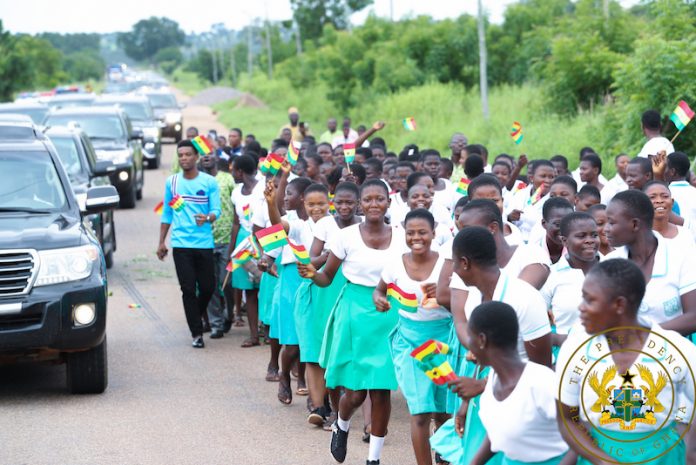|
Getting your Trinity Audio player ready...
|
“The Government of Ghana has tried in various ways to show her commitment towards the achievement of Universal Primary Education by ensuring that all children of primary school-age enroll and complete by 2015.
The government has shown this commitment through policy directives and interventions like the Education Strategy Plan (ESP) for 2003-2015, the Growth Poverty Reduction Strategy, the Free Compulsory Universal Basic Education Programme, and the 1992 Constitution of Ghana.
Strategies adopted to operationalize the policies include the introduction of the Capitation Grant (School Fee Abolition), expansion of Early Childhood Development Services, promotion of measures to improve Gender Parity in primary schools, and the introduction of Nutrition and School Feeding programmes”— UNICEF 2007 report.
With the genuine determination to get more children enrolled in school, the NDC government introduced the Free Compulsory Universal Basic Education (FCUBE) program in 1996 and included a cost-sharing scheme to cover non-tuition fees, under which parents were expected to bear limited expenses. Within this framework and other related education programs and targets, the capitation grant and other interventions were introduced by the Kufuor administration.
Back to power in 2009, and with an utmost commitment to improving upon these policies for the benefit of the poor, the NDC government under Mills/Mahama REVIEWED the capitation grant and increased its threshold by 50% ( thus from GHC3.0 to GHC 4.5). Of course, the REVIEW was never meant to CANCEL the policy but to IMPROVE upon it.
Likewise, the REVIEWS of the School Feeding Programme by the NDC government under Mills and Mahama was meant to give a positive face to the scheme as it is. For instance, the program in 2006 had only 2 schools in each of the 138 districts captured in the scheme. By May 2008, about 987 schools were captured under the scheme with 477,714 students enrolled in the scheme.
After the review and retargeting done by the Mills and Mahama administration, and by end of the 2016/17 academic year, 5,682 schools were captured with about 1,671,777 students, mostly from rural-needy communities, were enjoying the school feeding program. This for sure was an improvement after the REVIEWS.
In addition to this, and to free parents from other related costs, the free school uniforms, free leather school sandals, and free exercise books programs were introduced. Under these programs, about 209,415 school uniforms, 30,000 made in Ghana leather school sandals, and 4 million exercise books were distributed to pupils in deprived communities.
The above narratives draw us to a point that when Mahama and the NDC make the point that the Free SHS program will be REVIEWED, it means the program will be made better just like the other social intervention programs introduced by the Kufuor administration in the education sub-sector.
In NDC’s People’s Manifesto, the next NDC administration from 2021 to 2025, Mahama pledges to review the Free SHS policy and to make it better by:
- Ensuring that the numerous challenges the program currently faces are addressed and higher standards introduced.
- Expanding the Free SHS program to cover students in PRIVATE SHS in underserved/deprived areas to absorb the excess students thereby solving the problem of double-track.
- Abolishing the Double-Track System by completing all abandoned structures for secondary and technical institutions, including the abandoned E-blocks…and,
- Decentralizing and strengthening procurement of food and other materials to heads of senior high schools and their bursars.
The above proposals as captured on page 70, paragraph 7.2.3 of NDC’s People’s Manifesto, are the alternatives within the context of the Reviews the NDC and Mahama present to the people of Ghana.
Well, with their usual propaganda and smear campaign, the NPP and its communicators have decided to redefine “REVIEW” to mean “CANCEL”. They’ve decided to repeat this too, as usual, make it appear as the gospel truth.
Conversely, the NDC’s alternative proposals as captured in the People’s Manifesto appear to have better solutions to the myriad of challenges the current Free SHS program is facing than the NPP has offered.
The Writer: Issifu Seidu Kudus Gbeadese (Loud Citizen From Laribanga)





